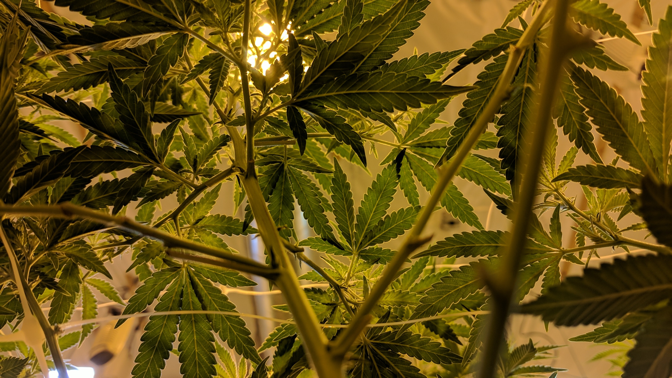By Liz Slocum Jensen April 18, 2018
I suggest that you forget the misconception that cannabis is a world shady stoners. Last year, I saw a parade of cannabis startups pitch at the LAUNCH festival, many of whom were insisting, “we’re a data company.” This industry is about to come out of the shadows and is attracting assertive and highly motivated thinkers and do-ers. Cannabis gives us a peek into the leading edge of agriculture for three reasons.
- Cannabis is highly lucrative to grow. Revenue is $112 per square foot, per Agrilyst.
- There is high consumer demand. Reported retail sales in 2016 was $6.7 billion in the US and is projected to explode to $20 billion by 2021.
- The grow lifecycle is 14 weeks.
These factors allow for an attractive and bankable market with a product that can handle rapid iteration and experimentation. As cannabis starts to legalize state-by-state across the US, the risk-averse are willing to work in this area.
Home-growing is connected and automated
Cannabis has a long history of in-home growhouses. We all know a guy who knows a guy who grew pot in a closet. Sure, nowadays, you could get weed delivered. But what about for those people who like home-gardening and weed? Today’s systems, like LEAF and Cloudponics, are fully automated and are about the size of a mid-sized refrigerator. LEAF involved NASA agricultural researchers in their development. This means that the team who figured out how to grow food in space designed a system to grow weed in your home. These systems consist of energy-efficient grow-lights, air filters, HD cameras, and sensors that monitor humidity, pH, water, temperature, and nutrients. And, of course, there’s a smartphone app to monitor your current plant stats. LEAF claims that users make their money back within a year, so I invite you to wrap your mind around those home economics. This would probably be one of the smarter appliances in a home. (Well, it would rival the smart, connected cat litter box. That tech is genius and benefits everyone in the house.)
The labs are staying ahead of Big Pharma
The third-party lab is a necessary stop between the harvest and retail shop since products need to be measured for potency and safety. Phylos Bioscience and Steep Hill analyze the DNA and genetically certify the marijuana products. Think 23andme for weed. They are capitalizing on the fact that the big labs are too risk-averse to identify and catalog cannabis. These companies have a decent head start from Big Pharma since they are working in a legally gray space. In a not-so-distant future in which marijuana is legalized and seen as a legitimately medicinal, Big Pharma will start to make its move into this sector. Fun fact: the NIH has reported that states with legalized marijuana had a 24.8% fewer annual opioid overdose deaths. These big companies have deeper pockets that would likely overtake these smaller players via acquisition or simply out-maneuvering them with their existing infrastructure.
The commercial growhouse is an IoT and AI center
On the commercial scale of growhouses, IoT and data analytics is emerging in cannabis in the form of grow sensors, cameras, and nutrient delivery. Grownetics installs sensors throughout the indoor growhouse to monitor and collect data. They then transform this data into predictive analytics so that they can alert customers of foreseeable failures. What is compelling about Grownetics’ business model is that they maintain ownership of the sensors. They own the data so that they can aggregate and organize across customers to create data intelligence that could help growers with forecasting and finding inefficiencies. I’m a little surprised that growhouse operators are ok with not controlling their data. Afterall, there is an historically top-secret attitude among growhouses. There could be a question of whether growers will ever want to control their data.
Whether you are a cannabis customer or not, this movement is becoming mainstream as states see the tax revenue and public health benefits of legalization. This is a good lucrative space for tech to iterate and figure out scaling problems before transferring solutions to food production problems. I just hope farmers don’t lose the incentive to grow food.

